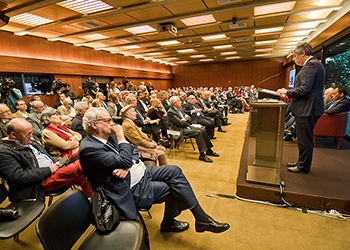Strengthening the Euro before the next crisis

Brexit is no longer the greatest uncertainty that Europe faces: there are other political threats and the forthcoming elections in Germany and in France might paralyse the European Union throughout a year. “The euro is today vulnerable and will not survive the next crisis”, warned the authors of the report backed by the Jacques Delors Institute (Paris and Berlin), Repair and prepare: the Euro and growth after Brexit, presented and debated at the Calouste Gulbenkian Foundation on 22 February. Hence, statements correspondingly focused on the need for a deep reaching reform strategy for the Eurozone where almost a decade of growth has been lost since the 2008 crisis.
The report sets out a “first aid kit” for the next crisis and that does not require any alterations to the Treaties and yet may render the Eurozone more resistant. This correspondingly highlighted the importance of completing the Banking Union, among other points as well as the need to strengthen the coordination of fiscal and economic policies. Furthermore, backing public and private investment represents another priority defined in the report that sets out the best approaches to preventing and managing crises while defending the long term establishing of a Eurozone Ministry of Finance. Fostering legitimacy, sharing risks and sovereignty, balancing responsibility with solidarity were among the facets that repeatedly came into focus during the debate that took place against the backdrop of Rome, where the meeting between the European Union leaders and heads of state is due to result in a process of political reflection on the future of Europe at the end of this month.
“We should not await the next crisis to strengthen the Euro. We are today in a good position to gradually and pragmatically strengthen Economic and Monetary Union. We should be capable of adhering to this project with enthusiasm. In doing so, this boosts the confidence in our economy and thereby nurturing investment, employment and convergence”, stated the Ministry of Finance, Mário Centeno, at the closure of the conference that counted upon contributions from Artur Santos Silva, António Vitorino and Enrico Letta, the former Italian prime minister and current president of the Jacques Delors Institute, among other speakers.
